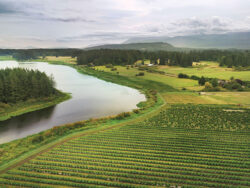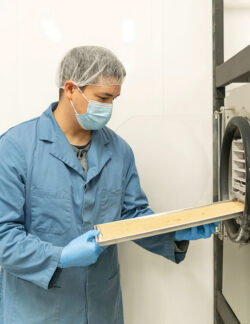Cedar Organics holds a distinctive place in Canada’s cannabis industry as an organic, sun grown trichome farm. That is, they practice outdoor organic cultivation in fields that spend six months of the year submerged under water to produce flower entirely for the purposes of live extracts. The LP then performs white labeling of their products, in addition to the external biomass they process, package, and label for other B.C. cannabis companies.
Cedar Organics is a 42-acre farm located in picturesque rural Vancouver Island, 15 minutes south of Nanaimo, B.C., where the neighbouring Quennell Lake swells over the fall and winter months, flooding the acreage. Fish, frogs, and other residual biotic life die and decompose once the fields drain, adding rich organic matter to the soil composition while encouraging a feast for droves of circling eagles overhead.
Once British Columbia’s regulations changed, producers were permitted to grow cannabis on the Agricultural Land Reserve (ALR), though counterintuitively, the province’s ministry of finance still does not consider cannabis cultivation to be a farming activity. The implications of which include hefty tax bills for B.C. growers that producers of other crops, like barley or alfalfa, will never see – a forthcoming issue to be addressed.
Once a potato farm, the property was later purchased by Cedar Organics’ founder Greg Kasting with investment from family and a couple friends, and was licensed in 2020. Of the 42 acres, approximately 28-acres are under cultivation. Outside, the property also exhibits year-round greenhouses for mother stock and clone production, and a covered harvest or staging area where plants are potted-up, prepped for planting, or brought in off the field for bucking.
Advertisement
A joint office-extraction building with additions under construction is the spoke of the operation, while 11 generator-powered freezer shipping containers that hold up to 40,000 kilos of fresh-frozen cannabis flower keeps product secure as it awaits processing. The LP has also acquired a 25-acre neighboring property to minimize contamination risks from non-compatible farming uses, as well as to serve as an expansion cultivation area when the time is right.
“It’s been a journey to find what we’re now focusing on,” says the CEO, Greg Kasting. “Trying to figure out what the market wants, what we’re good at, and what we’re capable of,” adds operations manager Rob Mason; “it’s been quite a year.”
Growing cannabis on a floodplain
The trichome farm, as it’s described, specializes in extracts. Now in partnership with Common Roots Extracts, the Canadian subsidiary of India’s Synthite Industries Ltd. and the world’s largest producer of value-added spices and botanical extracts, a new hydrocarbon extraction lab is being built on the property. The farm produces both solvent and solventless concentrates where 100 per cent of their product is live.

Aerial view of Cedar Organics’ 42-acre farm next to Quennell Lake, which swells over the winter months.
Photo: Cedar Organics
The cultivation team led by master grower Alex McKay is currently building up their mother stock as well to produce 40,000 clones of which 25-to-30-thousand plants will take root in the field. “It’s a 10-day turnaround from when they are removed from the cloning chamber as a fully rooted tray of clones,” says the Saskatchewan-born grower. Clones come out and populate the field mid-June beneath Cedar’s unique cultivation technique and they “start harvesting the lowest lying area around third of September and continue into October,” he says.
The harvest or staging area also stores nutrients and soil amendments for the mother plants. “There’s going to be a lot of potting,” says Kasting, “and as they harvest, they have hand bucking stations as well as an automated bucking system from Germany.”
Six months of the year the main field remains under water. “Last year we experienced a rain or flood event that inundated the fields like we hadn’t seen in 25 years,” he says, looking out over the land. “The plants are going into a very clean growing media once the water goes,” he says; “they thrive in it.”
Beneath the fields are 12 kilometers of drainage tiles one meter beneath the earth that gets pumped out to control the level. The irrigation system includes the tiles, risers, and two settling ponds connected to Quennell Lake, located on the other side of the fence that discerns property limits. Nearby, two sea cans house the filtration system, dosing it with natural fertilizers typically kelp-based.
McKay compares organic outdoor cultivation to hydroponic systems, which are “sterilizing.” Whereas here, the beneficial microbes nurture plants and bolster the resilience of their immune systems.
Typically, Cedar Organics is pulling 1,000 kilos of fresh flower off the field daily, with a target harvest yield of 30 to 40,000 kilograms of fresh flower. The flower is immediately frozen, and in another building, the extraction takes place. Ice water extraction works very well. About 150 kilos of frozen flower is washed daily, producing up to three-to-five kilos of bubble hash.
“We should be able to process our entire crop into live extracts in about six months, and then we’ll have the remaining six months for working with other peoples’ biomass to process for them as well,” says Kasting.
Taking root in the greenhouse
While touring Cedar’s greenhouses, master grower McKay describes growing experiences from previous years, including best performing cultivars and lessons learned along the way. Walking between rows of healthy mother plants, eggplant trap plants, and flower tents along the walls, a humidifier runs tirelessly and supplemental lighting powers the two 3,200 square foot greenhouses.

Operations manager Rob Mason reveals live organic extracts in a refrigeration unit. Photo: Kristina Kasting
In 2020, their first year, they planted 84 cultivars in the field. “One plant sprung up next to the irrigation pond by itself,” says McKay. “We never fed it; it just wanted to survive.” So, they tested the cultivar, and its results were actually quite high.
This year they’ll commercially cultivate six varieties and test about 20 newly created cultivars from their ongoing breeding program, determined using several grow tents housing two of each pheno. McKay allows the plants to flower and die on the stalk. “And as soon as I can go in and find a bud 20-30 per cent high, then that allows for the transferable elements,” he says. “We trial everything in the tents.”
McKay describes ideal node spacing on the outdoor plants for commercial growing and discusses the ways in which they stagger them so that certain cultivars finish earlier. “We had a year where the whole field was done at the same time,” he says. “So how do you pull 15-20 thousand kilos off the field at once? The answer is you don’t!”
One of their fan favourite strains, Orange Crush (California Orange x True Blueberry), is a hardy, photo period sativa they’ve worked with for over three years of careful selection and breeding. The crew has now identified an optimal genetic expression for their unique micro-climate, which happens to be Canada’s only Mediterranean climatic zone.
Touring the extraction facility
Currently, Cedar Organics sells bulk B2B products that end up on shelves primarily in Ontario, B.C., Alberta, and the Maritimes. They’re also moving into white labelling and contract manufacturing. The company intends to focus on working with B.C.-based brands and getting the CPGs as close to their final state as possible. “In about a month from now we will be able to do a full turnkey solution whereby our products are being end-packaged, labeled and excised on the farm, and shipped out,” says Kasting.
Inside the facility, operations manager Mason describes the various products they offer, in the new environment where they’re “tapering variables and getting a little bit more automated,” he says.
At the moment, processing includes ice water agitation of fresh-frozen flower into wet bubble hash, which is then freeze dried into dry, granular bubble hash, and pressed into live hash rosin, of which a large portion is then reformulated for use in vapes, infused pre-rolls and edibles. Cedar is now putting into immediate packaging bubble hash temple balls, live rosin dabs and vape carts. Infused pre-rolls are being manufactured through a partnership with ANC Solutions.
Kasting underlines the sea of data in need of organization. “Part of what we’re constantly struggling with is the sea of data that ensures compliancy. A large focus is now on how to simplify, streamline data, and improve operational efficiencies. One of the most important factors to our success has actually been the close down of Tilray’s facility in Duke Point,” he confides.
Mason is a former Tilray production manager who transferred to Cedar Organics when the Island’s Duke Point facility closed. Members of the quality assurance, inventory control and logistics teams as well as key production supervisors all came over from Tilray, leveling up the company’s operational excellence.
They now have eight staff who each have worked at least five years for Tilray and brought a different level of compliance and understanding to the company. This, coupled with the partnership with Common Roots (Synthite), their proprietary extraction processes, R&D abilities and full analytical testing lab on site speaks to the company’s new direction.
Common Roots will enable the delivery of organic live resin, diamonds, and terp sauces to the market, crafted by a low temperature extraction approach inspired by Synthite’s perfumery ingredients work.
Praveen Padmanabhan, director of Common Roots Extracts, considers the partnership with the LP to be a “white labeling powerhouse.” He advocates for sun-grown cannabis and the full spectrum of extracts it offers, stating: “there is a lack of high-quality outdoor cannabis products in Canada. We are focused on breeding for full-spectrum extracts with unique terpenes and effects.”
And still with the diligence that Cedar Organics barrels ahead, obstacles arise to meet them stemming from a B.C. government cabinet order in 2018, which specifically excludes cannabis cultivation as farming activity and is thus not eligible for many governmental support programs.
The company has seen their property tax bill increase eight times, and they must pay a $93,000 provincial tax bill. They are out on the forefront of this issue, calling out the injustice that is both hypocritical, coming from one of the only entities currently profiting from the sale of B.C. bud, and ironic, in that cannabis processing is considered a farming activity by the B.C. government.
“Unfortunately, we are now in appeals process and are trying to have this charge changed,” says Kasting. “We’re working together with the B.C. Craft Farmers Co-op where we’re seeing a whole range of unfair practices and stigmas related to the industry.”
The major regulatory issues proliferating Canada’s cannabis market must continue to be addressed, as only through public awareness and push back will there be change. In the meantime, the team at Cedar Organics preps the mothers and clones, the field for planting, and the new extraction facilities for processing, with an optimistic outlook on sunny days ahead.

